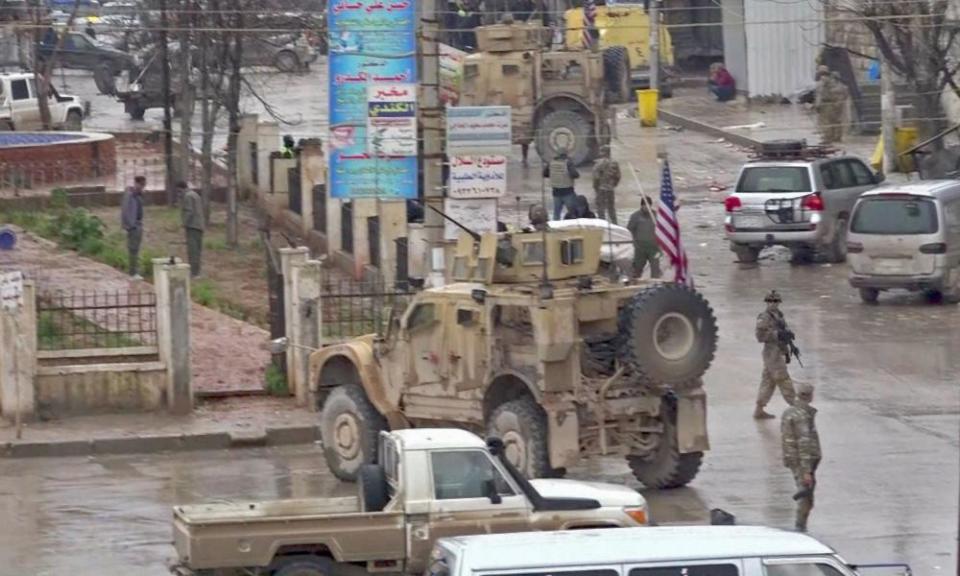Four Americans killed in Syria blast claimed by Isis

A suicide bombing claimed by the Islamic State has killed four Americans in north-eastern Syria, just weeks after Donald Trump said the terrorist group had been defeated and announced he was withdrawing American forces.
The bomber struck on Wednesday inside a restaurant in the town of Manbij, where US troops had regularly gathered. As many as 16 people were killed in the attack, the most deadly to target American forces during their four year presence in Syria.
US Central Command confirmed that two US soldiers, a defence department civilian official and a defence department contractor were killed. A CentCom statement said three soldiers were injured.
Photographs on a local Kurdish news site showed two mutilated bodies, several other bodies lying on the ground with people gathered around them, damage to a building and vehicles and blood smears on a wall.
Isis was quick to claim the strike through its propaganda wing, Ammaq. Although it has been ousted from Manbij as an organised force in the past four years, the group has maintained sleeper cells, which have launched occasional attacks against local officials and opposition fighters.
The bombing, which came just days after the first US battle trucks departed the country, underscored the volatility of north-eastern Syria. It gave fresh ammunition to critics of Trump’s decision, who had argued that the withdrawal was premature and could end up revitalising Isis, which had been on the ropes militarily in narrow stretch of territory it still controls near the Iraq-Syria border.
In a speech at the state department on Wednesday, Mike Pence, the vice-president, repeated the president’s claims of victory in Syria. “The caliphate is crumbling and Isis has been defeated,” said Pence, who made no mention of the Manbij attack.
But in the Senate, Lindsey Graham – a fierce supporter of the president on most other issues – suggested that Trump’s decision to withdraw had emboldened Isis, and compared the move to Barack Obama’s withdrawal from Iraq – a decision Trump bitterly criticised.
“My concern about the statements made by President Trump is that you set in motion enthusiasm by the enemy we’re fighting,” Graham said. “As they get bolder the people who are trying to help are going to get more uncertain.
“I saw this in Iraq and I’m now seeing it in Syria. Every American wants our troops to come home. But I think all of us want to make sure that when they do come home we’re safe. So I would hope the president would look long and hard of where he’s headed in Syria. I know people are frustrated but we’re never going to be safe here unless we’re willing to help people over there who will stand up against this radical ideology.”
Manbij had been the westernmost point of the US presence in north-eastern Syria and was due to be one of the first towns to be handed over to Turkish forces as part of a deal between Trump and Recep Tayyip Erdoğan to allow Ankara to send its troops to combat the Kurds – who had been US partners throughout the Isis fight.
Since Trump’s surprise December announcement, a diplomatic feud has ebbed and flowed between Washington and Ankara over the timing of the withdrawal and whether or not US proxies would end up being Turkish targets.
About 2,000 US troops had mentored and trained Kurdish-led units to fight Isis. That mission had been successful in pushing the group to the eastern edge of its former territory in Syria, while US-backed Iraqi forces pushed the group to Iraq’s western fringe.
But inside Iraq’s borders, and increasingly in Syria, remnants of Isis have been able to organise and conduct irregular attacks. Regional intelligence officials believe the organisation is reverting to its days of guerrilla war in Iraq.
“There have also been clear signs for many months that Isis maintains the ability to conduct a low-level guerilla-style insurgency in Syria, as typified by today’s attack,” said Charles Lister a senior fellow in counter-terrorism at the Middle East Institute. “This is Isis 101 – it is precisely how this jihadist organization has adapted and gone back on the attack in years past.”
Acknowledging the attack, the US military said: “US service members were killed during an explosion while conducting a routine patrol in Syria today. We are still gathering information and will share additional details at a later time.”
The White House said Trump had been fully briefed. One month after Trump’s surprise announcement, the US decision to pull out still resonates in the region. It prompted secretary of state Mike Pompeo’s eight country tour earlier this month – the central message of which was that Washington remained committed to its allies.
It also led James Mattis, the defense secretary, and Brett McGurk, the senior liaison to the Isis fight, to quit their roles in protest.
Trump’s national security adviser John Bolton, meanwhile, has attempted to mount a rearguard action, pressing upon Trump that the Isis fight is not yet won.

 Yahoo News
Yahoo News 